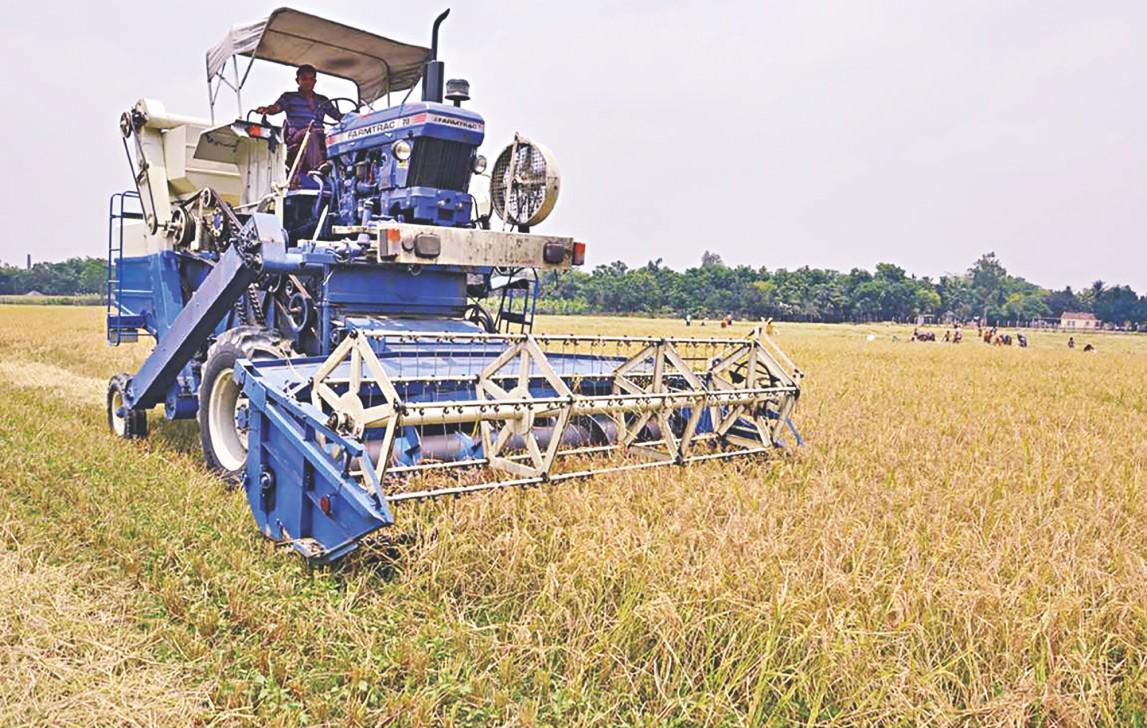Farm mechanisation gets a shot in the arm

Farmers may get 50 to 70 percent incentive while buying agricultural machinery and also avail low-cost loans, as the government looks to pivot to farm mechanisation amid rising costs and growing labour shortage.
The cabinet yesterday approved the draft National Farm Mechanisation Policy 2019 to this effect at a meeting held at the Prime Minister’s Office, which was presided over by the premier.
“Under the policy, farmers would be able to buy farm machinery at lower prices and will get low cost or interest-free loans in easy conditions,” Cabinet Secretary Khandker Anwarul Islam told reporters during a briefing at the secretariat.
Initially, the incentive would be given for a fixed period at the farmers’ level in order to get them accustomed to farm machinery. The support would be applied to quality equipment that are essential but used for a limited period, according to the draft policy.
Farmers in haor and coastal regions may get 70 percent subsidy to buy agriculture machinery, while those in other parts of the country would be entitled to 50 percent, said an official of the agriculture ministry.
As per the policy, importers would have to bring in machinery that suits the country’s environment and soil.
The prime minister also told the meeting to incorporate a provision that allows farmers to form a cooperative for buying expensive tools since the equipment are used a few times round the year, the cabinet secretary said.
The policy is expected to accelerate farm mechanisation in the country.
The use of farm machinery would cut the necessity of labourers needed to plant and harvest crops, allowing farmers to: deal with the unavailability of manpower, boost agriculture development and prevent wastes, according to a media brief of the cabinet division.
This will also drive the commercialisation of the farming system, it said, adding that the agriculture ministry would soon publish a notice. Givem the soaring cost of agricultural labour, the agriculture ministry has already sent a proposal to the finance ministry under the policy, seeking Tk 415 crore for this fiscal year in order to give subsidy to farmers for buying agricultural machinery.
Another proposal involving Tk 4,000 crore would be added to the initiative from the next fiscal year.
Under the Tk 415 crore scheme, the government will offer 3,000 combine harvesters, 2,000 reapers and 300 transplanters to farmers and farm equipment renters at a subsidised rate during the upcoming Boro season, according to a recent letter sent by the agriculture ministry to the finance ministry.
The latest move comes in the face of soaring wages due to a shortage of farm labourers during the peak season of harvesting and transplanting rice, causing a loss in the yield of rice that is cultivated on 71 percent of the total 1.54 crore hectares of cropland, according to official data.
Despite advancement in agriculture production, costs of farmers are rising owing to high labour wages and inefficiency at various stages of cultivation.
As a result, farmers fail to make a profit, the agriculture ministry said in the letter.
Due to high demand and reduced supply, daily farm wages go as high as Tk 600 during peak harvesting seasons, up from nearly Tk 300 in slack seasons.
In its letter, the agriculture ministry said the surging cost of labour has been making farmers helpless during the harvesting period for the last several years. This has made farmers reluctant about growing paddy.
According to agriculturalists and industry operators, currently farmers prepare more than 90 percent of the total croplands by using power tillers and tractors.
A majority of the grains, mainly rice, are threshed by threshing machines and the rate of mechanisation is growing as farmers find the use of agricultural machinery beneficial in terms of cost-saving and timely cultivation.
Yet, the progress in the transplanting of paddy and harvesting of the staple crop has been sluggish over the years owing to the high cost of machines, lack of the machinery suitable for harvesting all types of soils and the dearth of operators and mechanics, agriculturalists say.
Nearly one percent of paddy are transplanted and harvested using machines, said Md Monjurul Alam of the Department of Farm Power and Machinery of the Bangladesh Agricultural University, in November.
There is only 1 percent duty on the import of parts and raw materials needed to produce power tillers, power thresher, power reaper and power seeder and they are exempted from regulatory duty, supplementary duty and value-added tax.
But transplanters and combined harvesters are not included.
The duties would be cut further or made logical in future, the policy said.
The cabinet also approved the draft of the Voter Roll Law (Amendment) 2019.
At present, an individual can add their names to the voter list from January 2 to January 31; but under the proposed amendment the period has been extended to March 1.
It approved a proposal to observe March 1 as the National Insurance Day.
